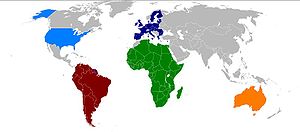
Image via Wikipedia
It would be easy to dismiss Tom Friedman’s new book, That Used to Be Us: How America Fell Behind in the World It Invented and How We Can Come Back, as a rehashing of his previous themes.
To some extent, that’s fair, but where this book differs is in its objective.
Whereas, for many years, Friedman has been a keen and astute observer of the way the world is changing because of globalization, this book is meant to be a really loud wake-up call, to give America and Americans the awareness and the sense of urgency of what will happen if we don’t act, decisively, to change our current trajectory.
In this respect, my thinking and his thinking align perfectly.
He cites the 4 major trends affecting us
- globalization
- IT revolution
- our large and growing deficits
- our pattern of energy consumption
as the forces at the core of the threat to the American Dream and the promise of the middle-class lifestyle.
He (and to be fair, this book is co-authored with Michael Mandelbaum), also addresses what 5 areas need to be our focus if we are to overcome the challenges.
- education
- infrastructure
- immigration
- research and development
- regulation
Now, while I don’t agree with everything they suggest, given my recent travels, I certainly agree with most of them.
They are optimistic…when all is said and done, America has historically risen to the challenges, but the road won’t be easy.
We MUST cultivate an environment of radical innovation and entrepreneurship in this new environment, make it easier for the right people to come into the country, make it easier for people to start businesses here, and provide the right type of education for our citizens.
These are easy things to say…not easy to do, particularly given the somewhat paralyzed nature of our government, which the authors address at length.
But, the book is a reframing of the discussion. Instead of saying, “oh, we have the best school in the county or the state,” ask, “how does our school compare to Shanghai, Sinagpore, or Helsinki?”
In my mind, that’s exactly what we should be doing. And it’s something we need to start doing NOW.
94% of the book is an assessment of the challenges and on those, I agree.
Where I walked away a bit disappointed was the solutions:
- more and better math/science education (easier said than done)
- a 3rd party presidential candidate
- belief in the American ideals
While both could make a difference, it left me feeling a bit lacking in terms of specifics.
Still, I fundamentally believe that most Americans do not yet fully appreciate the challenges of the new world order and on that score, I’d read the book.
If the resulting anxiety can help increase our odds of solving the problem, then I’m all for it.
